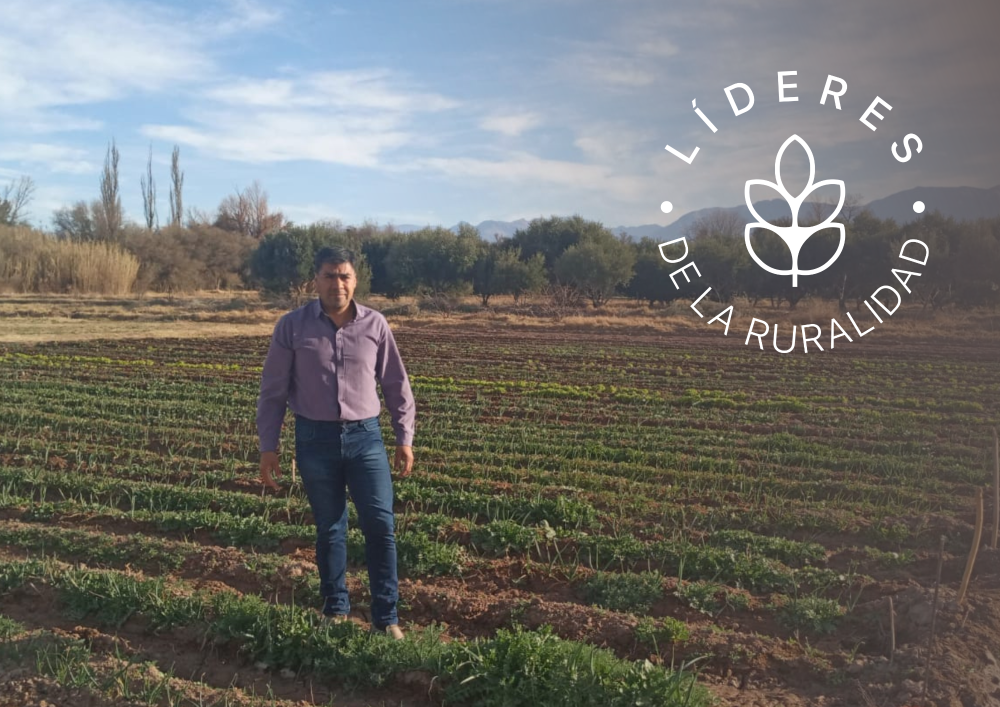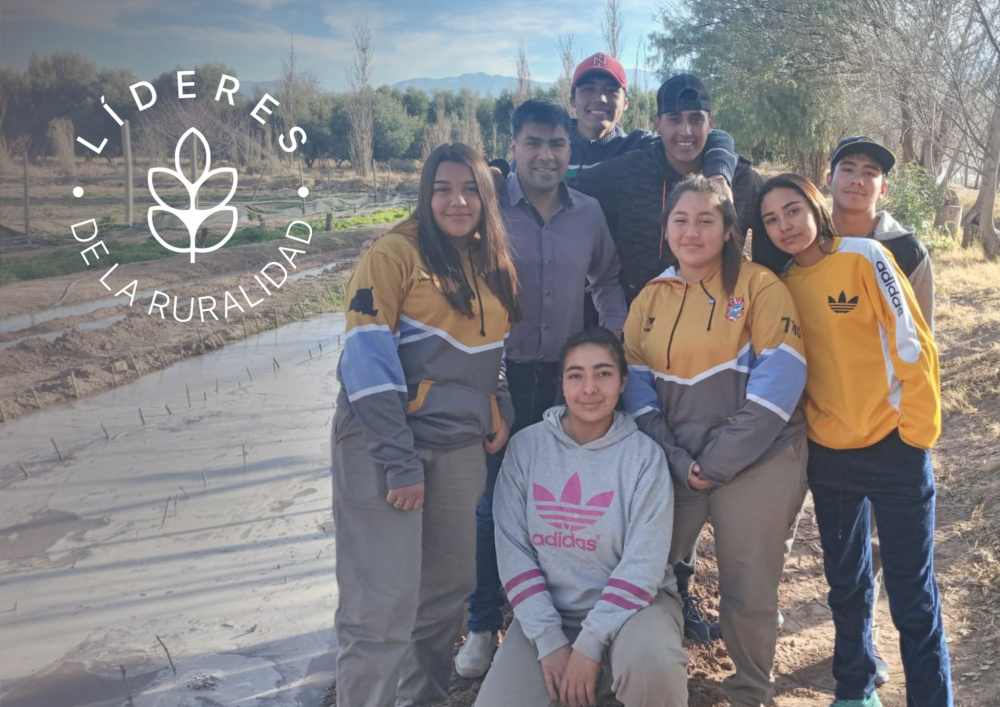José Muñoz, an educator and promoter of organic agriculture in northern Argentina, is awarded the title of “Leader of Rurality” by IICA

San Jose, 7 September 2022 (IICA). Argentine José Muñoz has been recognized as a “Leader of Rurality” in the Americas by the Inter-American Institute for Cooperation on Agriculture (IICA). For decades, Muñoz has been involved in agricultural technical education, a strategic tool for training young people and thereby encouraging them to remain in rural areas.
The award, known as “The Soul of Rurality”, is part of an initiative by IICA, the specialized agency for agriculture and rural development, aimed at recognizing men and women who are leaving their mark and making a difference in the rural areas of the Americas, which are key to the planet’s food and nutritional security and environmental sustainability.
José Muñoz has served as the principal of the Agricultural Technical School of Tinogasta, where he himself studied. Tinogasta is a small city in the province of Catamarca, in northwest Argentina. The area is arid, with poor soils, so artificial irrigation is used to grow crops. It is far away from the country’s most important productive areas.
In recent years, Muñoz has turned his hand to promoting organic agriculture, which he sees as a means to take advantage of the environmentally friendly practices and biological inputs that farmers already use. Today in Catamarca, an increasing number of farmers are being encouraged to seek certification as organic producers as a means of penetrating new markets and obtaining better prices.
The Leader of Rurality Award is designed to pay tribute to individuals who are playing a unique dual role: guaranteeing food and nutritional security by producing under all circumstances, as well as protecting the biodiversity of the planet. It also emphasizes their capacity to be positive role models in rural areas of the region.
A legacy for young people: a passion for agricultural production
The Agricultural Technical School of Tinogasta is in the Argentine province of Catamarca, at the foot of the Andes Mountains. José Muñoz entered the school as a student more than 40 years ago and has never wanted to leave the area.

He has dedicated his whole life to agriculture and education in this northwestern region of the South American country, far from the fertile plains of the Pampas. It is a mountainous area with a dry climate, where water is in short supply and the quality of the soil is poor.
The vast majority of producers are family farmers who work no more than three or four hectares of land, cultivating olive and quince trees and vines, and raising goats or sheep. Tinogasta has only 10,000 inhabitants.
Agricultural production depends on irrigation water, which is channeled from the rivers that flow across the valley and are distributed via canals. The rivers originate high in the mountains and are fed by melting ice, so summer is the season when their waters swell. During the rest of the year, water is scarce, because there is hardly any rain.
Under these difficult conditions, Muñoz has trained generations of young people, instilling in them a love for crop and livestock farming, and in recent years has become a strong promoter of organic production, an option that is becoming increasingly popular and helping farmers in the area to make a better living.
“When I was 15 years old, my classmates and I began to engage in different productive activities, raising chickens and building rabbit hutches. When I graduated, I was offered a job as a technical advisor for field work at the same school, so I stayed. Then I studied to a be a biology teacher and took various technical degree courses, got married, raised a family, and never left the school”.
Agricultural technical schools are strategically important for the productive development of rural areas and designed to encourage young people to remain in the countryside, in a country where agriculture is a key component of the economic, social, and cultural landscape. There are 525 agricultural technical schools across Argentina.
In 2013, Muñoz was appointed deputy principal and then began collaborating with some vintners in the area and specialists from the National Agricultural Technology Institute (INTA), which has a rural extension agency in Tinogasta, with the aim of finding ways to improve grape production.
Later appointed principal of the school in the place where he grew up, Muñoz was also involved in the launch of the Forum for Organic and Agroecological Production of the Province of Catamarca, working with local Ministry of Agriculture and Livestock officials. This farmers’ group also forms part of a larger body, the Forum for Organic Agriculture Production and Consumption and Agroecology of the Northwest Region of Argentina (the NOA, which includes six provinces). The latter forum is working on the creation of a digital Regional Register of Producers, with an agroecological approach.
Organic food production is a system based on holistic integrated resource management for sustainable production. Its food products contain no traces of agrochemicals or genetically modified organisms, which are expressly banned in both the growing and processing stages.
With support from IICA and the Inter-American Commission on Organic Agriculture (ICOA), Catamarca has been strongly promoting organic production, raising its profile with activities such as the NOA Organic and Agroecology Expo, held in December 2021, national and international business roundtables, and visits to establishments that produce organic foodstuffs.
According to José, “most producers in this area do not use agrochemicals, so our production could be classed as organic, because all the inputs are natural, but it isn’t certified. Certification is precisely what we are promoting, as it opens up new markets and the possibility of obtaining better prices. In Tinogasta, many winegrowers suspended operations around 20 years ago because of low prices and the ups and downs of the Argentine economy, but now they are back in business, and some are interested in organic production. There are also raisin producers who are currently seeking organic certification”.
“Organic production is an opportunity for small farmers. Thanks to their parents and the school, young people here learn good agricultural practices, which we all seek to pass on to them by our example. The students usually undertake field trips and visit agricultural establishments in other parts of Catamarca. They receive technical training in agricultural production”, he added.
Muñoz is convinced that the family farmers of Tinogasta know how to work their land and care for the environment: “Here producers will always produce healthy food and preserve natural resources. The land is generous, and yields are good. What is needed, apart from certification, is to operate on a larger scale. Some people came from China some time ago. They were interested in our beekeeping operations, and said they needed us to guarantee one-ton shipments of honey. That is not done here. That’s why we have to motivate people to grow”.
Still heavily involved in the Agricultural Technical School, Muñoz spends a lot of time talking with young people. At least half of the students leave Tinogasta when they complete their secondary education, as there is no university locally. Some never come back.
“I tell them to get trained and see farming as a way of being linked to nature and providing services to the community”, says Muñoz. “Agriculture gives one the satisfaction of feeling useful to society. Agriculture gives meaning to life. Small producers are very important, because we provide the food that many people need today. Poor distribution is another problem, but our responsibility is to keep producing, to help ensure future generations have food on the table, even if sometimes we don’t receive a fair price. Agriculture is not just about dollars and cents”.
More information:
Institutional Communication Division
comunicacion.institucional@iica.int